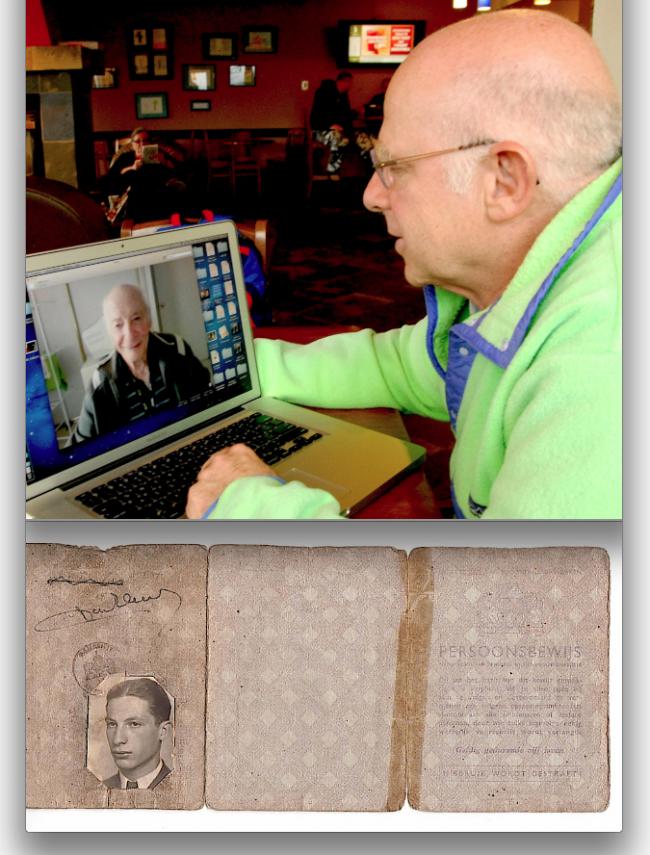Pictured right is Dr. Michael de Haan, a longtime anesthesiologist at Highline Medical Center, Burien, and West Seattle resident. He is on Skype at Tully's on Alki with his father, Jozeph, 89, in Melbourne, Australia. Two Dutch families hid Jozeph during the Holocaust in rural Friesland Province, and Michael helped those families get officially recognized by Yad Vashem in Jerusalem. Pictured below is Jozeph's identification at age 20. His name was changed, for safety, to "Willem Walvis".
An anesthesiologist at Highline Medical Center, Burien, since 1988, Michael de Haan is used to research. But his recent work was very personal, with a successful outcome.
The patient, you might say, was his father, Jozeph, now 89. Thanks to two brave, and loving, Dutch families who saved his life during World War II, Jozeph plays tennis, works out, and shops with friends in Melbourne, Australia. Unlike Ann Frank, who, too, was hidden in Holland, Jozeph, also a Jew, had a more fortunate fate. Ann Frank's life ended tragically, as we know, when she was captured and later died in the Auschwitz Concentration Camp in Poland.
In 2010, Michael, a West Seattle resident in the Admiral District, spent over eight months, including a poignant visit to Holland, tracking down members of the two families who hid his father on their farms in Friesland Province, in northern Holland. They helped Michael authenticate their heroic deeds because he wanted them to become officially recognized by Yad Vashem's “Righteous Among the Nations,” the State of Israel’s honorific for non-Jews who risked their lives to save Jews from extermination during the Holocaust.
While the recently updated Yad Vashem Holocaust Museum in Jerusalem is world famous, it may be less known that Yad Vashem is officially the "Holocaust Martyrs' and Heroes' Remembrance Authority" charged with the duty since 1963 of awarding the honorary title "Righteous among the Nations" to non-Jewish rescuers. To be honored, only a Jewish party can put a nomination forward and
the assistance has to be given without any financial gain expected in return (although covering normal expenses such as rent or food is acceptable).
Thanks to Michael, both families have just been recognized. They are the Dreijer family (now Dreyer), who now live in Ottawa, and the Rosier family, still in Holland. The Driejers hid Jozeph in a barn near their property for six weeks, in 1943, then led them to the Rosiers, where he lived, in the attic of their barn, attached to their house, for 16 months. The Rosiers were honored Jan. 11 in the Dutch retirement home of Siebrendina Meindertsma-Rosier, 94, the daughter of the original farmers. The Dreijers were honored April 23, with Prime Minister, Stephen Harper, attending.
Michael points to statistics that show Holland was extremely unsafe and unwelcome to Jews during the Holocaust while that country has deliberately given the (false) impression the Dutch were among the most helpful of the European nations. He believes that they should officially apologize, and said that Holland's reining Queen Beatriz came close when she visited Israel in 1995 and characterized Dutch non-Jews who saved Jewish lives as "the exceptionals".
"By saying they were the 'exceptionals', she was acknowledging that they are the exceptions," said Michael. "The truth is that for many years the Dutch government after the war promoted the idea of the resistance and really minimized the amount of collaboration that was in Holland during the war. Between 75 and 85-percent of Dutch Jews perished, the highest percent of any Western European nation. Many hidden in Holland were betrayed and caught.
Like others, including my parents, I had been taught that Holland had fewer collaborators and a large (Nazi) resistance movement. When I learned what actually happened, it was a blow. I was proud to be Dutch, then I heard the truth and said, 'Wow. Forget that'. And I applied for American citizenship the next day."
He said his father's struggles helped prepare him in medicine.
"Often in medicine I have the opportunity of having patients who society has ostracized," he said. "I think, 70 years ago I'd be chased because of who I am, nothing more. In medicine, I try not to be judgmental. Patients are patients. How can you be a part of what happened back there, and be judgmental? It just doesn't make sense."
Jozeph de Haan via Skype:
Jozeph spoke to the Highline Times by Skype from his Melbourne home for this story.
"I was extremely lucky, with a loving family," said Jozeph, referring to the Roziers. "They were very religious, Christian Dutch Reform, and lived a very quiet life. I did my share of milking the cows. I did go outside in the back of the farm but I really never walked around freely in the daytime. German soldiers used to patrol the area, about eight or 10. We had a dog and he barked so I was always warned when the postman, or somebody else, came by. Two of the soldiers came by twice.
"A lot of Dutch people collaborated with the Nazis," he said. "We all know it. There was a Dutch contingent of (Waffen) SS in the German Army. There were a lot of good people and a lot of bad people.
"A lot of people looked the other way and betrayed us," Jozeph continued. "The good people, unfortunately, were too few. But who are we to judge? If it would have been the other way around, would we have opened our house in helping? I don't know. I can't give an answer."


